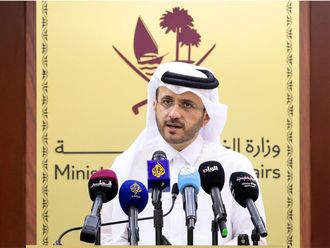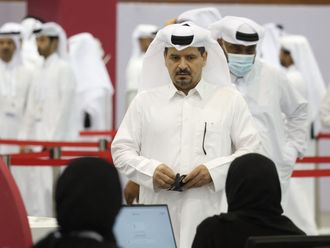Manama: Present and future prospects for the development of Qatar’s media industries were reviewed at a forum that brought together representatives from publishing, electronic media, digital media, public relations and advertising.
“This is the first time that Qatar’s media professionals have come together to formally discuss our industry,” Mohammad Jaidah, chief executive officer of Firefly Communications, said. “The active participation demonstrates that there is an interest in greater industry-wide engagement, and that Qatar enjoys a vibrant media scene ready for growth. Gatherings like these demonstrate the potential influence our industry could have through greater cooperation,” he said at the inaugural session of the Qatar Media Industries Forum.
Representatives from Oryx Media Services, Al Jazeera Network, Qtel, Qatar News Agency, local papers, as well as other businesses and organizations in Qatar’s media sector were present.
The forum provided the first structured opportunity for exchange and community-building within Qatar’s media industry and was a significant step forward for Qatar’s media industry, organizers said.
“Media attributes in Qatar, just as the rest of the country, continue to evolve at a phenomenal pace and a number of possibilities have arisen that could lead to disciplined priorities in line with the Qatar National Vision 2030 roadmap,” Everette Dennis, Northwestern University in Qatar (NU-Q) dean and CEO, said.
The university organised the forum and Dennis’ report “Qatar’s Media Scene: Current State and Possible Future” served as the basis for discussion.
Participants were divided into groups for roundtable discussions and each group debated one of four key sections in Dean Dennis’ report - Qatar’s existing media attributes, barriers to market entry, challenges for media development, and potential areas for media exploration.
In the discussion on media attributes, participants said that Qatar had a well-established traditional media infrastructure –with a variety of Arabic and English language newspapers, magazines and magazine groups, radio and television, satellite television, digital media enterprises and public relations and advertising firms.
The barriers to market entry sparked lively conversation and participants stressed the need for clear incentives for investment in media industries, a wider talent pool, increased clarity on comprehensive media law and regulatory framework, and further encouragement for international media firms to establish operations in Qatar.
The discussion of challenges to media development involved proposals to find workable and sustainable business models for subsidised media enterprises, managing the transition to digital media for all media industries, defining the role of government media and communications channels, determining the role of local TV and radio, and expanding the magazine industry beyond luxury, lifestyle and the general business market.
“We were encouraged by the overwhelming enthusiasm we received from participants, and hope that we can translate the energy in the room into future productive activities that will continue to build an environment of collaboration within the industry,” Dennis said.












